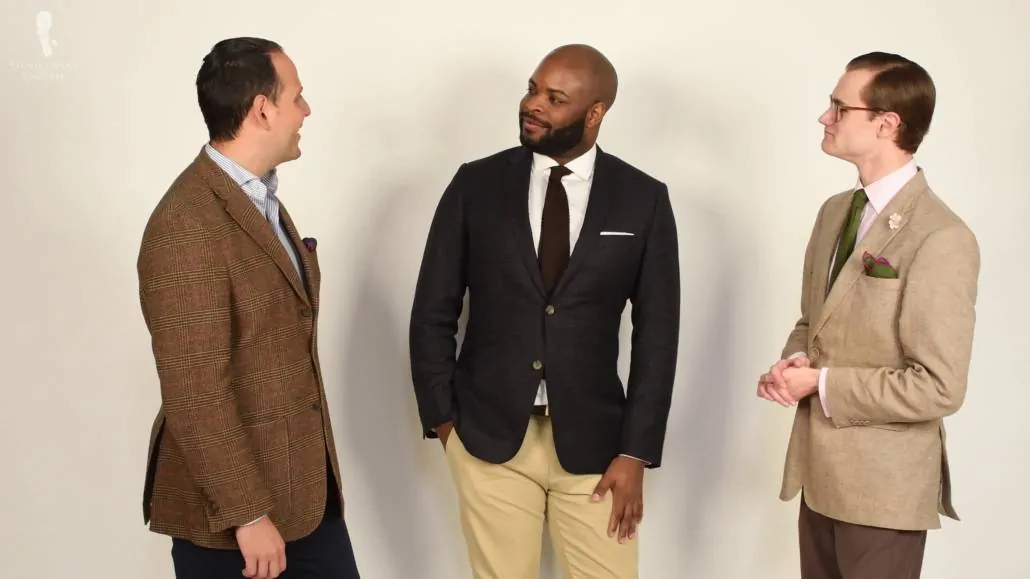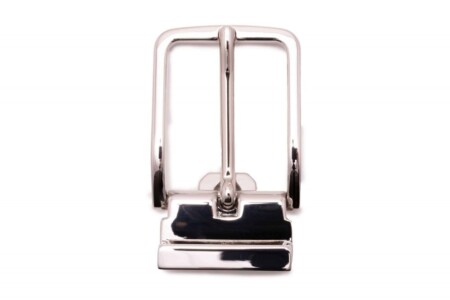It’s a common observation that societal change is happening ever more rapidly these days–but in an effort to leverage this change into self-improvement, we’re attempting to dispel seven societal lies to which too many men fall prey, and to provide advice for a more positive outlook.
- Lie #1: A man must be independent and solve his problems alone.
- Lie #2: Wealth determines a man’s value.
- Lie #3: Men should follow the same life trajectory.
- Lie #4: Men shouldn’t express emotions.
- Lie #5: Masculinity is defined by physical strength or athletic ability.
- Lie #6: Masculinity is defined by your fame, fortune, intellect, and power.
- Lie #7: Masculinity is defined by objectifying women.
- What We Think A Gentleman Is
- Conclusion
- Outfit Rundown
It should come as no surprise that in today’s world (particularly in the U.S. but also internationally), we find ourselves in an increasingly superficial society. The pervasiveness of advertising, the allure of celebrity, and the nature of competition, both economic and otherwise, all contribute to narrow definitions of success–and indeed, narrow definitions of manhood. A good deal of this also has to do with changing social dynamics on the topic of gender and the idea of so-called “toxic masculinity.” These conversations can be divisive, but in discussing them here, we hope to expose some key lies about what it means to be a man and tackle how to move past them when navigating modern society.
Lie #1: A man must be independent and solve his problems alone.
What’s the truth of the matter here? In short, having a support network is nothing to be ashamed of. Far from it, in fact! This is true on multiple fronts. Speaking socially, it’s just important for a man to have friends; human interaction and mental health go hand in hand, and while digital distractions and public health crises like the COVID-19 pandemic that’s occurring at the time of this post’s creation make it easier than ever to isolate ourselves, having a support network in other settings will also set you up for an environment of greater success.

In simplest terms, don’t be afraid to ask for help when solving a problem. This has two clear benefits: first of all, you can leverage the expertise of the other person and incorporate their skills into your own skill set for the future; and secondly, if you’re courteous about it, this can hopefully blossom into a relationship where the two of you can continue to rely on each other in the future when problems arise.
Lie #2: Wealth determines a man’s value.
Next, let’s tackle an economic lie: that a man’s intrinsic value must always be tied to his wealth. Society seems to put forward the idea that the measure of a man is tied to his bank account and his possessions. This is especially pervasive in the U.S., which has a society that often confuses who people are with just what they do. Indeed, one need look no further for confirmation of this point than the fact that “So, what do you do for a living?” is a common conversation starter and topic of small talk in the U.S. Personally, we find that not only can this question be awkward (especially to non-Americans), but it can also be somewhat shallow and limiting conversationally. If you’re looking for something a bit more substantive, though, check out our guide to 53 Great Conversation Starters.

The underlying truth to keep in mind here is that you shouldn’t measure your self-worth by your net worth, but rather by the content of your character. If you can make a positive impact on those around you and be someone that others would describe as enriching to their lives, then you’re definitely on the right track. We’re not saying that you shouldn’t work hard to support yourself and your dependents financially–hard work is important, of course. We’re just saying that you shouldn’t get too caught up in the “rat race.”
Lie #3: Men should follow the same life trajectory.
Let’s now get into a broader socioeconomic lie: that there is a natural progression into which all lives should ideally fall. We’re all likely familiar with some variation of this progression: good education, good job, romantic partner, marriage, house, kids, vacations, retirement. To put it frankly, this lie is untrue for two reasons: firstly, that the current economic reality both in the U.S and elsewhere is that not everyone is going to have the means to follow this progression; and secondly, because not everyone is going to want to follow this progression in the first place.

The nature of what constitutes a job continues to change every day, and a man doesn’t necessarily have to toil away through all of his younger years just to save money for a retirement that might not actually arrive in the classical sense. Furthermore, societal attitudes are also evolving with regard to romantic relationships. Not every man is going to desire a romantic partner and/or children, and that’s okay. As we mentioned before, so long as you’ve got a healthy outlet for emotional connection, it doesn’t necessarily have to be in a romantic mold.
Lie #4: Men shouldn’t express emotions.
Next, let’s talk about the notion that men must resign themselves to being less emotionally literate than women. Frankly, this one is just a straight bunk. The idea that a man must always tamp down his emotion–or indeed, have fewer emotions in the first place–is one of the biggest contributing factors to that aforementioned idea of “toxic masculinity.” To keep this one in the simplest terms possible: it’s okay to feel things and to express those feelings. Emotional literacy, or the ability to understand and communicate what you’re feeling, will lead to more fruitful interpersonal relationships.

Often, men are conditioned to believe that their emotions are simple things; that they should only ever feel happy, sad, angry, or neutral. This couldn’t be further from the truth. Behind these simplistic emotional descriptors, there’s an entire spectrum of motivating factors. Whenever you’re feeling a certain emotion (especially a strong one), try to take a step back and ask yourself the simple question of why. Then, the crucial next step: talk to someone about what you’re feeling. Having a sounding board to work through and interpret your emotions will make you that much more able to get past them if they’re troubling you, or just to have a better sense of your emotional makeup overall.
With the emotional discussion out of the way, let’s now get into the slightly thornier issue of the broader topic of masculinity. In the next two items on this list, let’s talk about what it means to be a man in the first place. Author and speaker Joe Ehrmann has hit the nail on the head with both of these lies, so we’ve paraphrased him here.
Lie #5: Masculinity is defined by physical strength or athletic ability.
Let’s first go over the lie that many boys are taught as early as grade school: that their masculine worth and value has something to do with their physical strength or athletic ability. Whoever is the strongest, fastest, or most physically resilient is often the most prized and praised, and thus, these ideas get wrapped up in a boy’s conception of his own self-worth. Physical fitness, for its own sake, definitely isn’t a bad thing, and you should always strive to feel personally healthy–but do rest assured that you don’t have to be a chiseled Adonis to be a man.

For a personal example here, I’m certainly not a peak physical specimen (as many of our commenters haven’t been shy to point out!), but I’ve made peace with the fact that due to a physical disability that I’ve had since birth, I’m just never going to be a star athlete. Could I put forward an effort to bulk up a bit and place a greater emphasis on my physical fitness? Certainly, I could–and I’d like to, as a general future goal. But, crucially, I don’t feel like less of a man because I can’t bench press a certain weight. I’m comfortable in my own body.
Lie #6: Masculinity is defined by your fame, fortune, intellect, and power.
Of course, physical fitness isn’t the only trait that’s prized and tied to success in this way. Fortune is another one, as we’ve already discussed, in addition to fame, intellect, and general power. The overall takeaway is that you don’t need to feel like you’ve got to be “the best” at something; strive for personal mastery and let your talents serve others as well as yourself.
Lie #7: Masculinity is defined by objectifying women.
The next big myth on masculinity comes just a bit later in most boys’ development than the one we just discussed, and as you might expect, it has to do with sex; young, developing boys often receive the message from society that being a man means seducing or objectifying girls in order to validate their own masculinity or self-worth. This not only damages boys, but also, of course, contributes to a culture of violence towards women. For a more in-depth look at our thoughts surrounding the general discourse on sexual harassment and gender relations, you can take a look at our response to the infamous “Better Men” ad from Gillette of a few years back.

In simplest terms here: people, no matter their gender, are people, and they deserve to be treated with respect. So, be mindful of both physical and emotional boundaries, and strive to be a man that is looked to by everyone as a trusted source of support and comfort. This, in fact, is just as true a definition of strength as anything physical.
What We Think A Gentleman Is
Much of what we’ve discussed here today is tied up in the broader conversation of what it means to be a gentleman in the 21st century. While we’ve discussed this before in greater depth, here are our principal conclusions on that point.
- A gentleman recognizes that he is imperfect, but at the same time, he maintains high standards and has a drive for continual, lifelong self-improvement.
- He is well-mannered, respectful, and courteous, and acknowledges everyone’s personal dignity.
- He is well informed, but also open-minded, willing to consider the perspectives of others alongside his own learnings.
- He recognizes the differences between aggressiveness and assertiveness, confidence and arrogance, and commands respect without being a jerk.
- Of course, a gentleman is well dressed, but again, as a matter of personal improvement rather than as a flashy display of wealth.
Conclusion
Remember that money, position and status can’t buy you class or respect. We firmly believe that any man–and really, any person–can be a gentleman if they choose to be, but this isn’t a choice to be taken lightly. It’s all about the journey, not the destination. In fact, the highest achievement is to be recognized as a gentleman by those around you, since ultimately, it is an honor that can really only be conferred by other people. So, if you can see through the misinformation and tune out the noise of some of the lies that we’ve discussed today, and strive for these greater ideals, you’re likely going to feel more secure as both a man and a gentleman.
What are your thoughts on the lies we’ve discussed today? In your opinion, what does it mean to be a gentleman? Share with us in the comments!
Outfit Rundown
I’m wearing a fairly casual outfit. Something that would be good for an informal get-together or a conversation between friends. As I’ve tried to structure this video here today, I’m working within a simple color palette of blue and brown. My polo shirt is navy blue and it has a slight ribbed texture in its weave and also features contrasting buttons with a brownish hue.

My trousers are in a plain brown shade, my belt is in dark brown with a silver buckle, and my shoes are also dark chocolate brown. They’re suede penny loafers from Meermin and completing the simple outfit today are some socks from Fort Belvedere; they’re also in navy blue, and they feature a subtle clock pattern in a lighter blue and white to give a bit of visual interest. You can find these socks as well as several other models and designs in the Fort Belvedere shop, along with a wide array of other men’s accessories including boutonnieres, pocket squares, collar clips, and much more.




Nice video gentlemen, I work in occupational health in a large steel producing plant in the U.K. a lot of the points struck a chord both personally and professionally as I often see men who have worked in this macho industry most of their lives, and by the time I see them from referral for mental health reasons I try to undo some of the classic expectations society has placed on them, in some ways being male in a modern age your in a no win situation show too much and … show too little and …. our women folk have a role to play in helping adjust our young men of the future with balance and consistency. There is so much mixed messages out there which laying waste to countless mens lives through suicide which is the number one killer for men between 18 years to 50 years in the U.K. alas.
Thank you.
Finally, someone who writes the classic truth about true masculinity.
Taking responsibility for actions and admitting fault are huge in my book. Men are typically quick to blame, and cannot accept fault. Toxic masculinity is a great pestilence throughout the world, especially when considering that men were known and respected for being men of the letters (as poets, authors, composers and such), decent, considerate, and compassionate.
Now, it is more typical to run into men who are selfish, narcissistic, and controlling. It seems that these poisonous traits are equated with masculinity today. These very beasts end up married with children, only to have their spouses leave them after ten to fifteen years of enslavement.
Parents allow such attitudes to prevail among their boys. But not all hope is lost.
So: thank you for writing this article.
Thanks so much for this article, and for all that you continue to do to convey what it means to dress well. So many men today can use this guidance and support if not just to keep up with changing times, then for head to toe confidence learning how to present themselves for every occasion.
I do not remember where I got this adage, but it goes like this:
Being a “MALE” is a matter of birth;
being a “MAN” is a matter of age, and
being a “GENTLEMAN” is a matter of choice.
1. A gentleman knows what to say and when to say it.
2. A gentleman knows what to do and when to do it.
3. A gentleman knows where to hide when he forgets #s 1&2.
A gentleman knows what to say, and when NOT to say it, as well.
Great read. I was raised with the understanding that a gentleman never ever makes another in his company uncomfortable. Regardless of their race, gender, education, economic status, and political or religious beliefs. No gentleman should ever believe himself better than another for any reason. I was taught to be grateful whenever my situations were better off than others and to strive to be a better person when my situations were worse off, but never be a snob and to always be as gracious as possible. This was driven home to me at an early age. So far this perspective has served me well.
thank you for your gazette . valuable information for all of us.
your book list was familiar having five titles in my library.
I forgot who said : « A real gentleman is the one who makes you feel like a gentleman when he is talking with you. » I would agree with that.
So lame.
Life is very simple: those that, do; those that cannot, journal log about a why they shouldn’t have to …
ps. If money is for cretins, stop charging 3x for items we can acquire for $10 at a 2 for 1 nilly-dilly garage sale … okay okay, you would say an “estate sale”
#gobigorgohome
#sorrynotsorry
Or maybe some of us are attempting to pass along what we already know to those who haven’t yet mastered the art.
Thank you, Jefferson! Our thoughts are exactly the same as yours!
A quote ascribed to Count Clemens von Metternich, chief envoy for The Hapsburg Emperor, Austrian Empire, The Congress of Vienna settling affairs remaining after the conclusion of the Napoleonic Wars..as follows:
” A diplomat is a gentleman who never permits himself the pleasure of a triumph. ”
So it follows that within every gentleman there is found some character of a diplomat.
Don’t criminalize ‘Lie #3’. There is nothing wrong with that scenario on life, and more often than not those who follow it are fulfilled. Sure, there are deviations, but sometimes excuses are offered as to why life is not great, when good old fashioned ‘nose to the grindstone’ is trivialized.
It’s not about criminalising so much as encouraging men to march to the beat of their own drum and choose a pathway in life that suits them. I’ve got just as many friends – male and female – who’ve chosen what I’ll call the ‘traditional’ pathway (for want of better word) where they complete their schooling (+/- tertiary education), get a job, romantic interest, marriage, kids, travels/holidays and retirement (sometimes followed by more travel) then death. Nowadays there’s also the strong expectation that one buys a house, usually somewhere between getting a job and before becoming a parent.
By the same token, I’ve got just as many mates who haven’t followed this pathway. For example, one got a job straight out of high school, worked a combination of temporary positions between overseas trips and then several years in permanent jobs – a mixture of administration and retail – before going back to university to study in their thirties. After graduating, they’ve gone overseas to travel some more doing casual work to pay for food and housing giving them freedom to travel. They’re neither a home owner nor do they have a steady partner or children.
It boils down to what makes you feel happy and comfortable, what’s practical for you and your individual needs. There’s no right or wrongs.
Well said you!
Excellent article and video – thoughtful and thought-provoking. I agree with the several posted comments and when distilled, they address good manners. Not good manners a la which fork to use, but general good manners that connote gentlemanliness and the ability to make others comfortable.
I also think part of being a “real man” is the ability to express kindness – not to be mistaken for weakness – but just general goodwill, politeness, and manners. No matter what one’s station, it’s easy to give up a seat on a train, take home a lost dog, help a stranger find their way through an airport, let the person with only 1 item get in line in front of you – there are zillions of examples. Kindness helps build the soul.
This is lovely! Thank you, Christopher, for sharing.